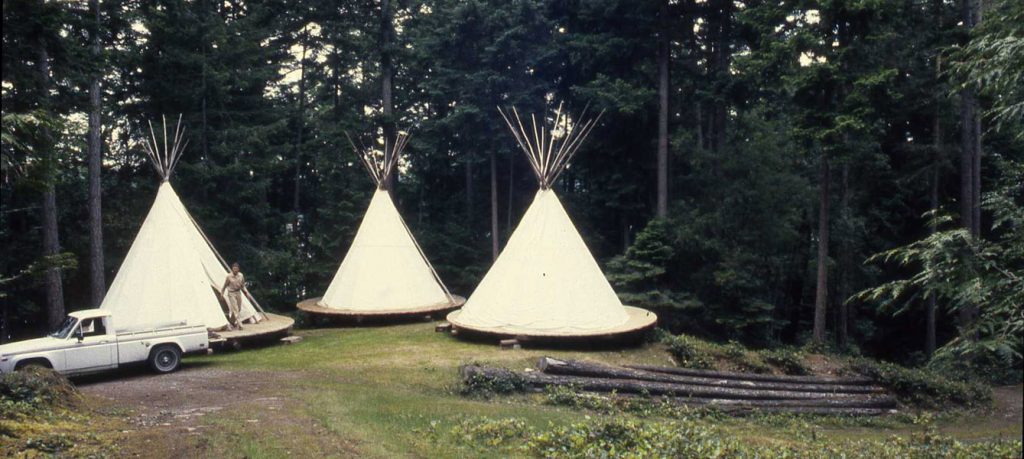CIFC Announces New Housing in 2022
In 2022 we are announcing a change for Canoe Island French Camp: this year, we will start housing campers and guests in custom octagonal bell tents, replacing the tipis we have used since Dr. Austin established CIFC in 1969. We, Ben and Margaret, along with the board of directors, are excited about this change and we invite dialogue with campers, staff, and alumni about this new housing.
This past year we’ve spent some time as an organization examining our traditions, the values behind those traditions, and the message these traditions project to our community and to the larger world. This led us to interrogate ourselves about the logic and cultural sensitivity of using tipis on Canoe Island.
When Dr. Austin founded the camp 50 years ago, he erected tipis to house campers and staff. The choices Dr. Austin made in creating camp were motivated by his desire to cultivate an atmosphere of joy, whimsy, and beauty. These values are still evident in our architecture and in our program: consider the fanciful beauty of the Colombier, the decadence of the bon voyage banquet, or the improbability of a tiny island in the Salish Sea being home to a French Camp.
We also know that one of Dr. Austin’s founding principles of Canoe Island French Camp was helping young people gain new perspectives. Dr. Austin believed in framing our experiences through a multicultural lens with respect and nuance. With this principal in mind, we realized it was time to make a change. We are an organization devoted to French language and culture; without strong, authentic ties to native tribes, continuing to use tipis is outdated, ill-suited to our mission, and exoticizes still-living indigenous cultures to the young minds and that we have a responsibility to educate.
Sleeping in a tipi is unique and memorable, and we know that many of our staff and campers have cherished this experience. When considering the new housing units, we sought to preserve the best parts of tipi-living and also live up to our values as an organization. For one, we wanted a housing unit that would retain the experience of sleeping surrounded by nature: the sounds of wildlife in the mornings, the crisp air, the occasional bird popping in to say “coucou.”
We also chose these new tents with an eye for sustainability. The lodge poles of the tipis needed to be replaced roughly every eight years and, as beautiful as the wooden poles are, this frequent replacement defied our environmental goals. The new units will use highly-recyclable anodized aluminum frames instead of wood. And lastly, we wanted housing that would continue the aesthetic tradition that is so familiar to the CIFC community: white against green wooded vistas.
We know that some friends of CIFC may be skeptical about this change, but we believe campers and visitors to the island in 2022 will find that the new tents are beautiful and practical. The tents’ straight sides will offer more functional living space and the tent’s fly will keep the canvas pristine longer. And unlike tipis, the new tents will not have a gap at the center, meaning campers will stay dry and cozy when it rains. We expect that before long our community will discover the tents’ particular joys and advantages, weaving them into camp tradition for years to come.
CIFC is an organization that is steeped in tradition but we are also a dynamic and ever-evolving organization. As we move into the future and build upon our years of tradition, we must continually examine our camp’s culture, respond to our community’s needs, and strive to meet the standards and mores of contemporary times. This change is born of what we hope will be a continuous mindset of thoughtfulness and curiosity. We also hope that this change will better exemplify these values of thoughtfulness and curiosity as we try to impart them to young people.




